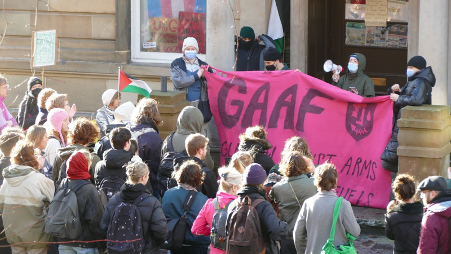Words: Ava Ahmann (She/Her) and Nina Halper (She/Her)
‘Muscatelli you can’t hide, severe ties with genocide’.
‘Viva viva Palestina’.
Wednesday 24th of January, 2024, a group of students marched up University Avenue and over to the cloisters at The University of Glasgow with homemade banners and megaphones in hand. They arrived below an office where university officials sat to discuss the institution’s investments. The students, belonging to the organisation Glasgow Against Arms and Fossil Fuels (GAAF), are looking behind the 573 year old walls at The University of Glasgow, revealing the ethical issues underneath the university’s investments, and demanding change through student action.
As revealed in a recent report made by GAAF, in 2023 the university invested £5.5 million in the arms trade, including in companies like BAE Systems who have sold weapons such as the F35 combat aircraft and the MK 38 Mod 2 machine gun to Israel. GAAF criticises The University of Glasgow as complicit in genocide and the war on Gaza through their investments in arms and failure to recognise the level of institutionalised racism this contributes to. The students’ most recent demands call for the university to divest in the arms trade, ban all arms companies’ recruitment on university campus, form a public inquiry into the university’s involvement in the genocide of Palestistians, pledge to donate £5million a year over the next 20 years to the Islamic University in Gaza, and commit to implementing a set of decolonisation measures led by student groups.
Despite continual action from GAAF over the last decade to protest for the university’s divestment, they have recently taken a more staunch approach to holding the university to account; occupying number 11 Hetherington, a university building just off University Avenue. At a time when student activists in the United States are being doxxed and sprayed with ‘skunk spray’ and climate activists in the United Kingdom face increased criminalisation for their actions, the GAAF occupiers face pushback from the university that could threaten their degrees and livelihoods. This fear is underscored by the memory of the violent end to the 2011 Hetherington occupation in which Anton Muscitalli, principal of The University of Glasgow, brought the occupation to an end through police interference. With three helicopters, a dog patrol, and numerous police officers, the removal of the occupiers was by no means peaceful, dislocating one of the student’s shoulders in the process.
Push came to shove on the 6th of February when David Duncan, Chief Operating Officer and University Secretary, gave the students an ultimatum, ending the free movement in and out of the building by locking the doors, allowing students to leave but not to reenter. The occupiers locked themselves into a core room and engaged in negotiations with Duncan, who, in an email sent earlier in the day, had accused the occupation of having ‘caused disruption to classes and inconvenience and stress for colleagues’, arguing that his actions were in line with university policy. The email largely failed to recognise or address GAAF’s recent set of demands, instead reframing their demand to set aside £5million a year to rebuild the Islamic University in Gaza, as an upfront sum of £100million, making the demand sound far less realistic, whilst also refusing to mention GAAF’s other demands in the email.
GAAF are reluctant to trust the integrity of how the university handles their demands, due to the university going back on their word at the previous court meeting last semester. GAAF had disrupted the meeting, demanding that the university board members read out their statement. After liaising with the university security and management, they were told that Duncan would read the letter to the court, record the response, taking concise minutes of what each member had to say, and send the recording to GAAF as immediate evidence. Not only did Duncan fail to read the entirety of the letter, but the meeting was never recorded.
Duncan has routinely offered GAAF the ‘olive branch’ of an involvement with a ‘working group,’ yet this has only been offered after GAAF began the occupation. ‘Why does the occupation have to take place so that student voices can be heard in the working group, that’s unacceptable, they should be heard anyway’ argued one member of GAAF in an interview prior to the dissolvement of the occupation. Throughout the occupation, GAAF received donations and support from a wide coalition of students and staff, ‘there is a lot of solidarity, the first week was exhausting, the risks aren’t the same for everyone – different intersectionalities and disabilities as well, and different financial situations,’ citing the threat of disciplinaries from the University which is a risk for the students involved. For those involved, the occupation is fulfilling a key tenet of University of Glasgow’s marketing; ‘we were told world changers welcome, and we are here to change the world.’
Despite the occupation’s formal end, GAAF remains positive that the negotiations with the university staff on the last day in Hetherington 11 have the makings of a potentially constructive dialogue between activists and the university’s higher offices. If talks fail however, GAAF has stated that they will return to direct action as a path forwards.

